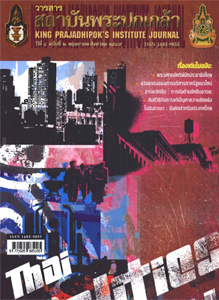คอร์รัปชัน : แนวคิด การต่อต้าน และข้อสังเกตบางประการ
Main Article Content
Abstract
อาจจะกล่าวได้ว่า ได้มีความพยายามที่จะกาหนดนิยามความหมายของการคอร์รัปชันเอาไว้อย่างมากมาย และแต่ละนิยามความหมายเหล่านั้น ก็ได้นาเสนอขอบเขต หรือเงื่อนไขต่างๆ ที่สามารถที่จะอธิบายได้อย่างครอบคลุมเกี่ยวกับแนวคิด และลักษณะของการคอร์รัปชัน ได้เป็นอย่างดี ซึ่ง ไมเคิล จอห์นสัน1 นักวิชาการทางด้านรัฐศาสตร์ชาวอเมริกัน ได้ทาการจาแนกนิยามความหมายของการคอร์รัปชันต่างๆ เหล่านั้น เอาไว้อย่างน่าสนใจ และง่ายต่อการทาความเข้าใจ โดยเขาได้แบ่งออกเป็น 2 กลุ่มด้วยกันคือ การนิยามความหมายจากประเภทของพฤติกรรม (Behavioral-Classifying Definitions) และการนิยามความหมายจากการกรอบแนวคิดว่าด้วยระบบอุปถัมภ์ (Patron-Agent-Client Definitions) โดยสามารถแสดงรายละเอียดของนิยามความหมาย ในแต่ละกลุ่มได้ดังนี้
Article Details
@ 2020 King Prajadhipok's Institute The Government Complex Commemorating All Right Reserved.
References
Johnson M. “The Search for Definition: The Vitality of Politics and The Issue of Corruption.” International Social Science Journal 149 (September 1996): 321-335.
Johnson M. “What Can Be Done about Entrenced Corruption?.” In Annual World Bank Conference on Development Economics. Boris PlesKovic (ed.). Washigton D.C.: The World Bank, 1998. pp. 69-90.
Werner S.B. “New Direction in The Study of Administrative Corruption.” Public Administration Review 43 (March/April): 441-456.
Naim M. “The Corruption Eruption.” Brown Journal of World Affairs 2 (Summer 1995): 245-261.
Seftel M. “Misunderstanding African Politics: Corruption and Governance Agenda.” Review of African Political Economy 76 (1998): 236, 418.
Goudie A.W. and David Stasavage. “A Framework for analysis of Corruption.” Crime, Law and Social Change 29 (1998): 113–159.
Shaid Alam M. “Anatomy of Corruption: An Approach to the Political Economy of Underdevelopment.” American Journal of Economics and Sociology 48 (October 1989): 441-456.
Heywood P. “Political Corruption: Problems and Perspectives.” Political Studies XLV 3 Special Issue (1997):639–658.
Sung Hung-En. “A Convergence Approach to the Analysis of Political Corruption: A Cross National Study.” Crime, Law and Social Change 38 (2002): 137-160.
Khan M. “The efficiency Implications of Corruption.” Journal of International Development, 8 (1996):683–696.
Shleifer A. and R. W. Vishny. “Corruption.” Quarterly Journal of Economics CX 3 (August1995): 681-712.
Hutchcroft Paul D. “The Politics of Privilege: Assessing The Impact of Rents, Corruption and Clientelism on the Third World’ Development.” Political Studies XLV3 (Special Issue): 639-658.
Alatas S. H., “Political Corruption: Problems and Perspectives Paul Heywood.” in Political Studies XLV 3 Special Issue (1997): 425-426.
Tarkovski J. “Old and New Patterns of Corruption in Poland and USSR.” Telos 80 (1989): 51-62.
Philp M. “Defining Political Corruption.” Political Studies 45 (1997): 436-462.
Pope J. “Enhancing Accountability and Ethics in the Public Sector.” In Curbing Corruption: Toward a Model for Building National Integrity. R. Stephenhurst and S. Kpunden (eds.) Washington D.C.: World Bank, 1999.
Gillespie K. and G. Okruhlik. “The Political Dimensions of Corruption Cleanups: A Framework for Analysis.” Comparative Politics 24 (October):77-82.
Scott J. C. “The Analysis of Corruption in Developing Nation.” Comparative Studies in Society and History 11 (1969): 315-341.
Rose-Ackerman S. “Democracy and “Grand” Corruption.” International Social Sciences Journal 149 (September 1996): 365-380.
Ades A. and Di Tella R. “The Causes and Consequences of Corruption: A Review of Recent Empirical Contributions.” IDS Bulletin 27 (1996): 496-515.
Meny Y. “Fin De Siecle’ Corruption: Change, Crisis and Shifting Values.” International Social Sciences Journal 149 (September 1996): 309-320.
Eigen P. “Combatting Corruption Around The World.” Journal of Democracy 7 (1996): 158-168.
Pradhan S. et al. Anticorruption in Transition. Washington DC: World bank, 2000.
Hidenheimer A.J. et al. Political Corruption: A Hand Book. New Brunswick, NJ: Transaction, 1989.
Syed Hussein Alatas. The Problem of Corruption. Singapore: Donald Moore Press Ltd, 1986.
Klitgaard R. Corrupt City: A Practical Guide to Cure and Prevention. Oakland: ICS Press, 2000.
The World Bank. World Development Report 1997: The State in a Changing World. New York: Oxford University Press, 1997.
Rose-Ackerman S. Corruption and Government: Causes, Consequences and Reform. New York: Cambridge University Press, 1999.
Langseth P.; R. Stephenhurst and J. Pope. “The Role of a National Integrity System in Fighting Corruption.” SDI Working Papers 400/142, Shelf No.1976. Washington DC: Economic Development Institute of the World Bank, 1997: 10–22.


